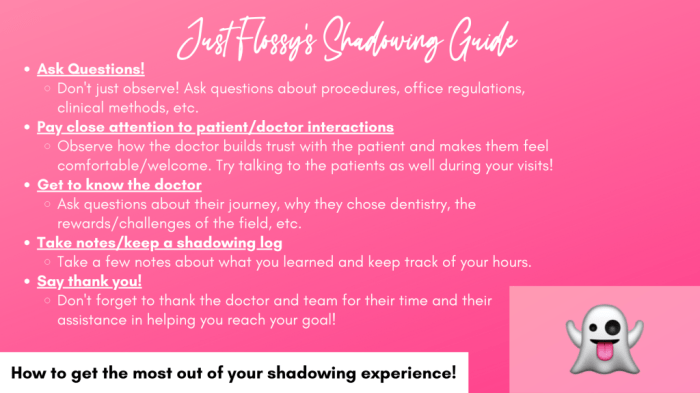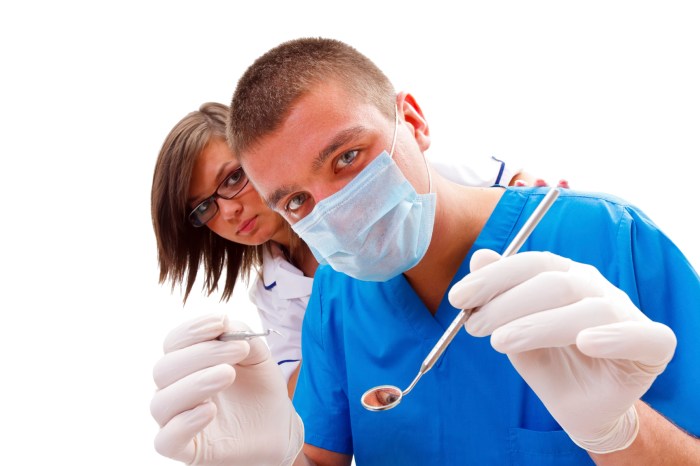Embark on a journey of discovery as we delve into the realm of questions to ask a dental hygienist when shadowing. This comprehensive guide unveils the secrets of the profession, empowering aspiring individuals with the knowledge and confidence to navigate the field of dentistry.
As you immerse yourself in the daily routines of a dental hygienist, seize the opportunity to gather invaluable insights through thoughtful inquiries. From understanding the intricacies of dental instruments to grasping the fundamentals of patient care, this guide serves as your roadmap to a successful shadowing experience.
Instruments and Techniques: Questions To Ask A Dental Hygienist When Shadowing
Dental hygienists employ various instruments and techniques to maintain oral health. These include:
- Scaler: Removes plaque and tartar from tooth surfaces.
- Curette: Scrapes bacteria and calculus from tooth roots.
- Dental floss: Cleans interdental spaces and removes plaque.
- Ultrasonic scaler: Uses high-frequency vibrations to break down plaque and calculus.
- Air polisher: Sprays a mixture of water, air, and abrasive powder to remove stains and biofilm.
Dental hygienists follow strict sterilization and disinfection procedures to prevent cross-contamination:
- Instruments are sterilized in an autoclave using heat and pressure.
- Surfaces are disinfected with EPA-approved disinfectants.
- Handpieces and other equipment are cleaned and lubricated regularly.
Patient Assessment and Treatment Planning
Dental hygienists conduct thorough patient assessments to determine appropriate treatment plans:
- Medical history review: Collects information on current and past medical conditions, medications, and allergies.
- Oral examination: Inspects teeth, gums, and oral tissues for signs of disease.
- Radiographs: X-rays or other imaging techniques to assess bone structure and hidden decay.
Based on the assessment, dental hygienists develop individualized treatment plans that may include:
- Preventive measures: Education on proper oral hygiene, fluoride treatments, and sealants.
- Therapeutic measures: Scaling and root planing, periodontal treatments, and fillings.
- Restorative measures: Crowns, bridges, and implants.
Documentation and record-keeping are crucial for tracking patient progress and treatment outcomes.
Oral Hygiene s and Education

Dental hygienists provide essential oral hygiene s to patients:
- Professional cleanings: Remove plaque, tartar, and stains from teeth and below the gum line.
- Fluoride treatments: Strengthen tooth enamel and prevent decay.
- Sealants: Protect teeth from decay by sealing grooves and fissures.
They educate patients on proper oral care practices:
- Brushing techniques: Demonstrate effective brushing methods to remove plaque and bacteria.
- Flossing: Instruct on proper flossing techniques to clean interdental spaces.
- Diet and nutrition: Provide guidance on healthy eating habits that promote oral health.
Dental hygienists play a vital role in promoting preventive dental care.
Collaboration with Dentists and Other Healthcare Professionals

Dental hygienists collaborate closely with dentists:
- Assisting in dental procedures: Provide support during examinations, treatments, and surgeries.
- Monitoring patient progress: Track treatment outcomes and communicate with dentists about patient status.
- Providing patient education: Reinforce oral hygiene s and answer patient questions.
They also interact with other healthcare professionals:
- Physicians: Share patient information and coordinate care for patients with systemic conditions that affect oral health.
- Nurses: Collaborate on health promotion and disease prevention programs.
- Other dental professionals: Work with dental assistants, lab technicians, and specialists to provide comprehensive dental care.
Career and Professional Development

Dental hygienists require an associate degree or bachelor’s degree in dental hygiene from an accredited program.
Continuing education is essential for maintaining knowledge and skills:
- Continuing education courses: Attend conferences, workshops, and online programs to stay updated on the latest techniques and advancements.
- Specialty certifications: Pursue advanced training in areas such as periodontal therapy or dental public health.
Dental hygienists have access to professional organizations and resources:
- American Dental Hygienists’ Association: Provides professional development, advocacy, and networking opportunities.
- Dental Hygiene Foundation: Supports research and education in dental hygiene.
- State and local dental hygiene associations: Offer continuing education and networking events.
Query Resolution
What are the essential instruments used by dental hygienists?
Dental hygienists utilize a wide range of instruments, including scalers, curettes, explorers, and mirrors, each designed for specific tasks in maintaining oral health.
How do dental hygienists assess patients’ oral health?
Dental hygienists conduct thorough examinations, including visual inspections, probing, and charting, to evaluate the condition of teeth, gums, and overall oral health.
What are the key components of patient treatment plans developed by dental hygienists?
Treatment plans encompass personalized recommendations for preventive care, such as brushing and flossing techniques, as well as specific interventions to address any identified oral health concerns.